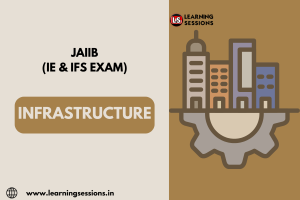Infrastructure plays a significant role in shaping the economic landscape of any country. In India, infrastructure development is important for sustaining economic growth, enhancing productivity, and improving the quality of life for its citizens. Learning Sessions presents this article on the case study that examines the importance of infrastructure in the Indian Economy (IE) and the Indian Financial System (IFS), focusing on the key roles and significance.

📚 JAIIB Study Resources 📚
👉 Check Here
👉 Check Here
👉 Check Here
👉 Get Tests Here
👉 Check Here
DOWNLOAD PDF INFRASTRUCTURE -CASE STUDY
Infrastructure is the backbone of economic development, facilitating trade, investment, and overall growth. It encompasses various sectors, including transportation, energy, water supply, and telecommunications. Infrastructure projects are labor-intensive, creating numerous job opportunities across various skill levels. This helps reduce unemployment and improves livelihoods. Quality infrastructure enhances the standard of living by providing access to essential services such as healthcare, education, and sanitation.
For the extensive preparation of candidates, get details through our YouTube videos for JAIIB IE & IFS Module wise Syllabus with explanations and tips to help candidates in their preparation journey.
You may also like these JAIIB case studies:
JAIIB | IE & IFS | LATER STAGE FINANCING
JAIIB | IE & IFS | EARLY STAGE FINANCING
The Role of the Indian Financial System in Infrastructure Development:
- Funding and Investment: The Indian Financial System (IFS) plays a crucial role in mobilizing funds for infrastructure projects through various channels, including public-private partnerships (PPPs), foreign direct investment (FDI), and institutional financing.
- Financial Instruments: A range of financial instruments, such as infrastructure bonds, masala bonds, and project finance, have been developed to cater to the specific needs of infrastructure financing.
- Risk Management: The IFS provides mechanisms for risk assessment and management in infrastructure projects, ensuring that potential risks are identified and mitigated.
In the end, Infrastructure development is a foundation of the Indian Economy (IE) and the Indian Financial System (IFS), driving growth, employment, and improved living standards. While challenges such as financing gaps, regulatory hurdles, and land acquisition issues persist, the future of infrastructure in India holds promise through sustainable practices, digital advancements, and enhanced collaboration between the public and private sectors. Considering the dynamics of infrastructure development for JAIIB applicants is important. Learning Sessions provides additional information about JAIIB IE & IFS MARKET OF ECONOMY by giving examples of real life scenarios.
Learn more about this case study through our YouTube channel and PDF.
Get access to our Telegram Channel for free Pdfs of JAIIB.
You May also Find these JAIIB Posts Useful
FAIR GLOBALIZATION AND DEGLOBALIZATION
PARTICIPANTS OF FOREIGN EXCHANGE (FOREX) MARKET
TYPES OF FOREIGN EXCHANGE (FOREX) MARKET





